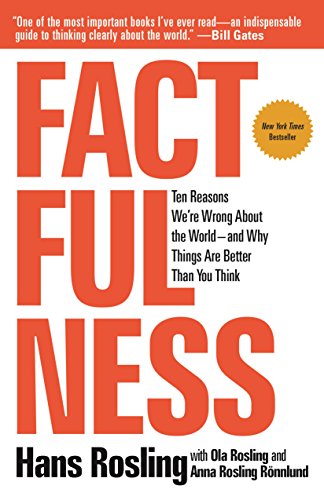
Notes on
Factfulness
by Hans Rosling
• 4 min read
The Gap Instinct
People are thinking with old data. I wonder in how many fields this holds true. Or at least, peoples thinking across fields. Say, someone educated in computer science thinking about medicine as if it were 1970.
When people are asked questions about the world (situation), they get them more wrong that had the questions been answered randomly. This means that there is something structurally wrong in peoples understanding of the world.
Be careful when people try to compare averages. Averages are good but don’t show the whole picture. The same goes for comparing extremes. There is always going to be extremes, but remember, most people are on either end. They are in the middle. It’s not just rich / poor. There is a whole scale between the two.
The Negativity Instinct
There is no denying that the world has gotten and is getting better. But that is not to say that we should be satisfied. There are still a lot of injustices and inequalities in the world. We can’t get complacent nor stop chasing what we know is right.
Remember that bad news is more likely to reach you.
The Straight Line Instinct
Not all lines are straight lines.
Remember that you may not be seeing the whole picture (or the whole graph).
The Fear Instinct
“Yet here’s the paradox: the image of a dangerous world has never been broadcast more effectively than it is now, while the world has never been less violent and more safe”.
The Size Instinct
When you get a number, try to get another one to compare it to. 4.2 million dead babies in 2016. But in 1950 it was 14.4 million. So a number that, before, sounded really huge, is actually very small. It’s still not optimal, but it’s better.
The Generalization Instinct
Realize that the students in a lot of the other countries are working much harder than those in the western countries. Make up for this. The difference in work ethic (and how much they party) is flooring. This was not a point of the chapter, but something of a point from one of the stories told therein.
The Destiny Instinct
Many things appear to be constant just because the change is happening slowly. But just because it’s slow it doesn’t mean that there is no change. Remember to update your knowledge; learn.
The Single Perspectice Instinct
Constantly test your favorite ideas for weaknesses. Be humble about the extent of your expertise. Be curious about new information that doesn’t fit, and information from other fields. And rather than talking only to people who agree with you, or collecting examples that fit your ideas, see people who contradict you, disagree with you, and put forward different ideas as a great resource for understanding the world.
“Give a child a hammer and everything looks like a nail”.
The world cannot be understood without numbers. But the world cannot be understood with numbers alone.
I really like this chapters conclusion. It’s on page 202.
The Blame Instinct
The blame instinct is the instinct to find a clear, simple reason for why something bad has happened. And this same instinct is triggered when things go well. “Claim” comes just as easily as “blame”. When something goes well, we are very quick to give the credit to an individual or a simple cause, when again it is usually more complicated. If you really want to change the world you have to understand it. Following your blame instinct isn’t going to help.,
The Urgency Instinct
Calls to action makes you think less critically, decide more quickly, and act now. This makes you do things you wouldn’t otherwise have done.
We do not seem to have a similar instinct to act when faced with risks that are far off in the future. In fact, in the face of future risks, we can be pretty slothful. That is why so few people save enough for their retirement.
Recognize when a decision feels urgent and remember that it rarely is.
Liked these notes? Join the newsletter.
Get notified whenever I post new notes.